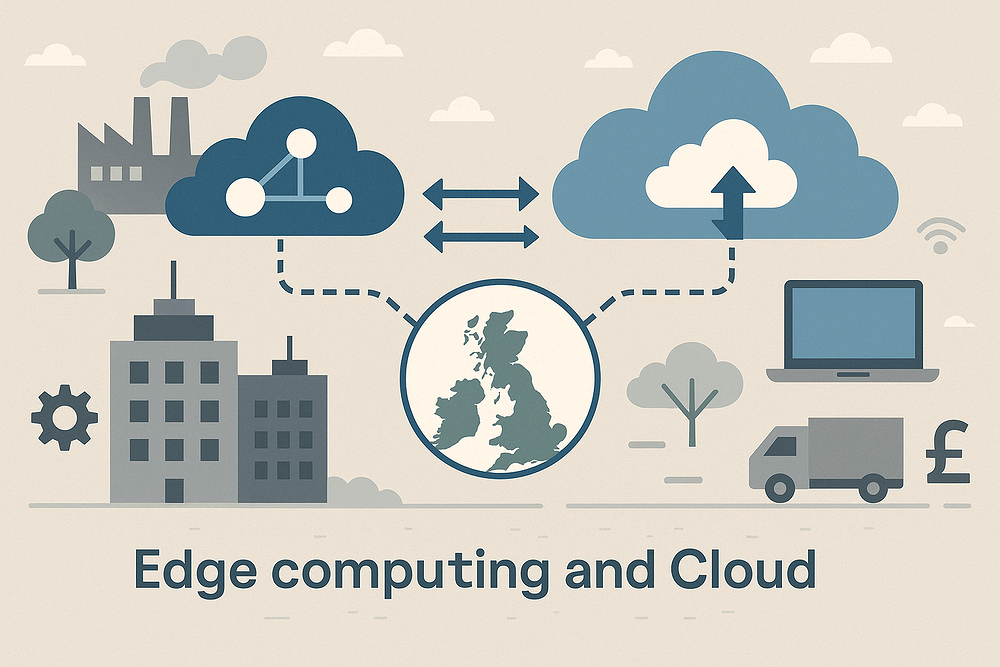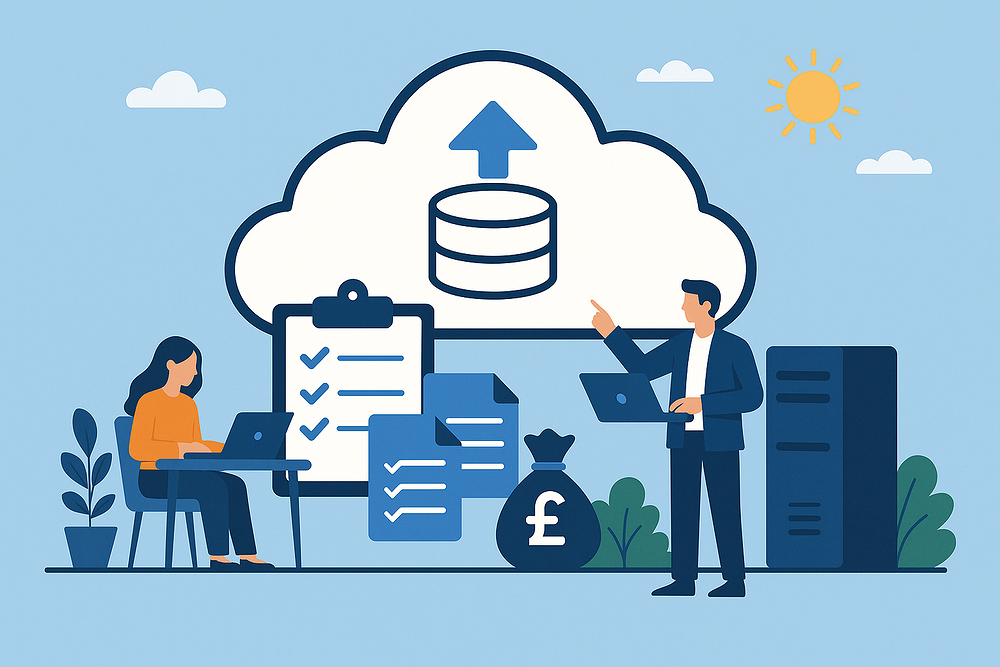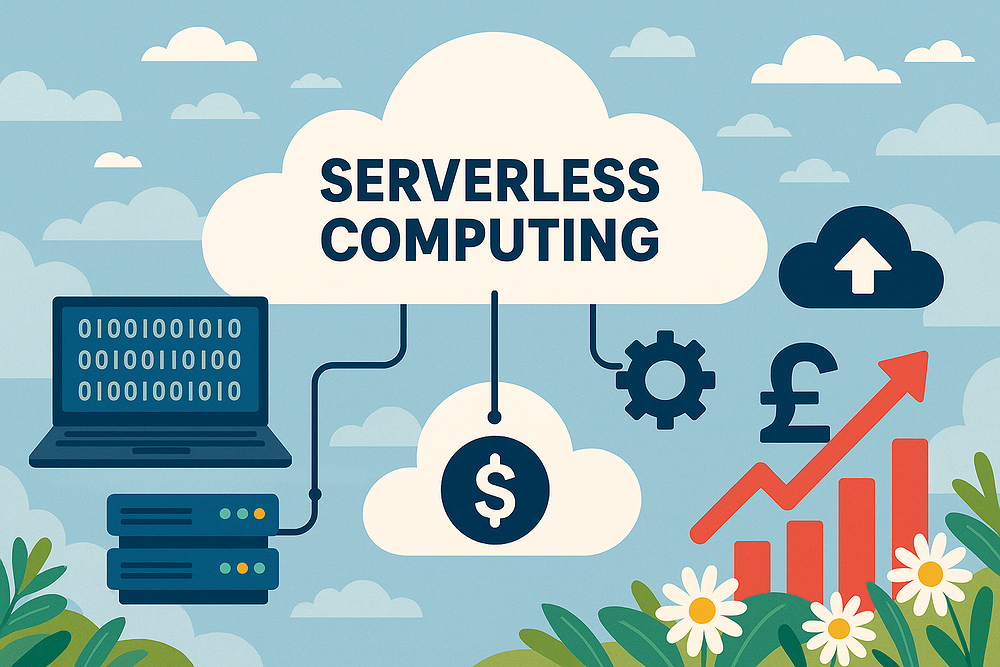Edge Computing and Cloud: The Hybrid Approach Transforming UK Industries

Edge Computing and Cloud: The Hybrid Approach Transforming UK Industries
As we move through the spring of 2025, UK businesses continue to navigate an increasingly complex digital landscape. The integration of edge computing with traditional cloud infrastructure has emerged as a game-changing strategy for organisations seeking to optimise their operations, enhance customer experiences, and maintain competitive advantage. At AppCoder, we've witnessed firsthand how this hybrid approach is revolutionising industries across the United Kingdom.
Understanding the Edge-Cloud Hybrid Model
Before diving into industry applications, let's clarify what we mean by an edge-cloud hybrid approach. Traditional cloud computing centralises data processing in remote data centres, while edge computing brings computation closer to data sources—devices, sensors, and local servers. A hybrid approach strategically distributes workloads between these environments to maximise benefits and minimise limitations.
Key Components of the Hybrid Model
- Edge devices: Sensors, IoT devices, and local processing units that capture and process data near its source
- Edge gateways: Intermediate systems that aggregate data from multiple edge devices before sending selected information to the cloud
- Cloud infrastructure: Centralised computing resources that handle complex analytics, long-term storage, and enterprise-wide applications
- Orchestration tools: Software that manages the flow of data and workloads between edge and cloud environments
This architecture isn't just technical jargon—it delivers tangible benefits including reduced latency, bandwidth savings, enhanced privacy, and improved operational resilience. For UK businesses facing increasingly stringent data regulations post-2023 Data Reform Bill, this approach offers particular advantages.
Real-World Applications Transforming UK Industries
The hybrid edge-cloud model is making significant impacts across various sectors in the UK. Here's how different industries are leveraging this technology in mid-2025:
Manufacturing and Industry 4.0
The UK manufacturing sector has embraced edge-cloud hybrid solutions to power its Industry 4.0 initiatives. Factory floors now feature edge devices that monitor equipment in real-time, detecting anomalies and predicting maintenance needs without constant cloud connectivity. Meanwhile, the cloud handles historical analysis and cross-facility optimisation.
A Yorkshire-based automotive parts manufacturer recently implemented this approach and reported a 32% reduction in unplanned downtime and 18% improvement in overall equipment effectiveness (OEE) within just six months. Their edge devices make split-second decisions about machine operations, while cloud systems optimise production schedules across multiple facilities.
Retail and Customer Experience
In retail, the hybrid approach is transforming both online and brick-and-mortar experiences. Major UK high street retailers have deployed edge computing systems that power in-store analytics, personalised shopping experiences, and inventory management. These systems work even during internet outages, with data synchronising to the cloud when connectivity resumes.
For example, a leading department store chain now uses edge computing to power "smart mirrors" in changing rooms, providing product recommendations without lag, while their cloud infrastructure analyses shopping patterns across all locations to inform merchandising decisions.
Healthcare and Patient Services
The NHS and private healthcare providers are increasingly adopting hybrid edge-cloud solutions to enhance patient care while maintaining strict data governance. Edge devices monitor patients and process sensitive data locally, sending only necessary information to cloud systems for broader analysis and record-keeping.
Following the spring 2025 NHS Digital Transformation initiative, several trusts have implemented remote patient monitoring systems that use edge computing to alert healthcare providers about critical changes in patient conditions, while using cloud infrastructure for long-term health trend analysis and research.
Financial Services
The UK's financial sector faces unique challenges around data security, transaction processing speed, and regulatory compliance. The hybrid approach allows banks and fintech companies to process sensitive transactions at the edge—reducing latency and keeping certain data within specific jurisdictions—while leveraging cloud resources for analytics and customer relationship management.
Since the Bank of England's updated cloud computing guidance released in January 2025, financial institutions have accelerated their adoption of hybrid architectures to balance innovation with compliance requirements.
Overcoming Implementation Challenges
While the benefits are compelling, adopting a hybrid edge-cloud approach isn't without challenges. UK businesses implementing these solutions typically face several hurdles:
Integration with Legacy Systems
Many UK organisations, particularly in established sectors like manufacturing, utilities, and public services, operate with legacy infrastructure that wasn't designed for edge computing. Successful implementation requires thoughtful integration strategies that bridge old and new technologies without disrupting critical operations.
Security and Compliance
Distributing computing across multiple locations creates new security considerations. With the UK's post-Brexit data protection framework continuing to evolve, organisations must implement comprehensive security measures across both edge and cloud environments. This includes encryption, access controls, and regular security audits tailored to this distributed architecture.
Skills and Expertise
The UK continues to face a digital skills gap, with the latest government figures from March 2025 indicating that demand for cloud and edge computing expertise outpaces supply by nearly 3:1. Organisations often need external support to design, implement, and maintain these hybrid systems effectively.
Best Practices for Implementation
Based on our experience helping UK businesses adopt hybrid edge-cloud solutions, we recommend these best practices:
- Start with clear use cases: Identify specific business problems where the hybrid approach offers tangible benefits
- Implement in phases: Begin with pilot projects that demonstrate value before scaling across the organisation
- Prioritise security by design: Build security measures into your architecture from the beginning, not as an afterthought
- Invest in orchestration: Select tools that effectively manage the flow of data and workloads between edge and cloud environments
- Consider connectivity resilience: Design systems that can function effectively even during temporary connectivity disruptions
The Future: What's Next for Edge-Cloud Computing in the UK
As we look ahead to the latter half of 2025 and beyond, several trends are shaping the evolution of hybrid edge-cloud computing in the UK:
5G and Enhanced Connectivity
The continued rollout of 5G networks across the UK is creating new possibilities for edge computing. With the government's recent announcement of 85% population coverage achieved this spring, more organisations can leverage high-speed, low-latency connections between edge devices and cloud resources.
AI at the Edge
Artificial intelligence capabilities are increasingly moving to edge devices, enabling more sophisticated real-time processing without cloud dependency. This trend is particularly relevant for applications requiring immediate decision-making, such as autonomous vehicles and advanced manufacturing systems.
Sustainability Considerations
With the UK's commitment to net-zero emissions by 2050 and interim targets approaching, organisations are evaluating the environmental impact of their computing infrastructure. The hybrid approach can contribute to sustainability goals by optimising energy usage across distributed systems.
Conclusion: Is a Hybrid Approach Right for Your Business?
The edge-cloud hybrid model offers compelling benefits for UK organisations across industries, but it's not a one-size-fits-all solution. The optimal approach depends on your specific business requirements, existing infrastructure, and strategic objectives.
At AppCoder, we specialise in helping UK businesses evaluate, design, and implement cloud and edge computing solutions tailored to their unique needs. Whether you're looking to enhance operational efficiency, improve customer experiences, or strengthen data security, our team can help you navigate the complexities of today's computing landscape.
As we move through 2025, the organisations that thrive will be those that strategically leverage both edge and cloud computing to create resilient, efficient, and innovative digital environments. Is your business ready to embrace this hybrid future?
Talk to us about your next project
Our team of experts is ready to help bring your ideas to life with solutions tailored to your business.
Get in Touch

